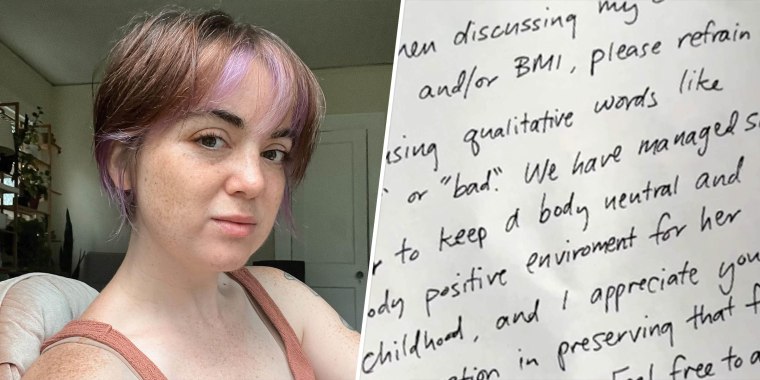North Carolina mom Caroline Hardin is teaching her 9-year-old daughter to have a body-neutral mindset.
“We focus on what our body can do rather than its appearance,” Hardin tells TODAY.com.
So ahead of a visit to the pediatrician, Hardin drafted a letter requesting that the doctor “refrain from using qualitative words like ‘good’ or ‘bad’ when discussing weight.”
“We have managed so far to keep a body neutral and body positive environment for her childhood, and I appreciate your cooperation in preserving that for as long as we can,” Hardin wrote. “Feel free to ask to speak with me outside the exam room if you have any concerns. Thank you!”
When Hardin shared the note on TikTok, she was inundated with supportive comments.
“I wish I had done this earlier with my kids. They dread the yearly check up because of this specific complex,” one person wrote.
Added another, “One of my earliest memories was the pediatrician pointing to where I was on the growth charts vs. where I should be. This is powerful!”
Hardin says her daughter’s pediatrician appreciated her approach.
“The doctor came in and asked, ‘Can I show you the growth chart with no numbers on it?’ And I gave her the thumbs up,’” Hardin says. “We left the appointment feeling so good.”
According to Dr. Deborah Gilboa, a family physician and parenting expert, conversations that are shame-based or blame-based can increase a child’s risk for body-dysmorphic disorders and unhealthy relationships with food.
“It can drive kids toward hiding their eating and attaching eating to emotional regulation in negative and positive ways,” Gilboa tells TODAY.com.
Gilboa encourages providers to have discussions around emotions — not meals or snacks. She recommends asking questions such as, “Is your body doing everything for you that you want it to do?” and “What are some of your tools for when you don’t like how you feel?”
“When I see patients, I talk about healthy habits,” Gilboa says. She highlighted five things that have been proven to improve kids’ overall fitness and nutrition:
- Eating breakfast every morning
- Eating takeout no more than once a week
- Moving 60 minutes a day
- No more than two hours of recreational screen time a day
- And no more than 6 ounces of sweetened drinks per day
“Those five interventions make a huge difference,” Gilboa previously told TODAY. "And if you can do them before age 12, that’s when you’re not only building patterns, that’s when you’re still mostly in control of what they eat.”
